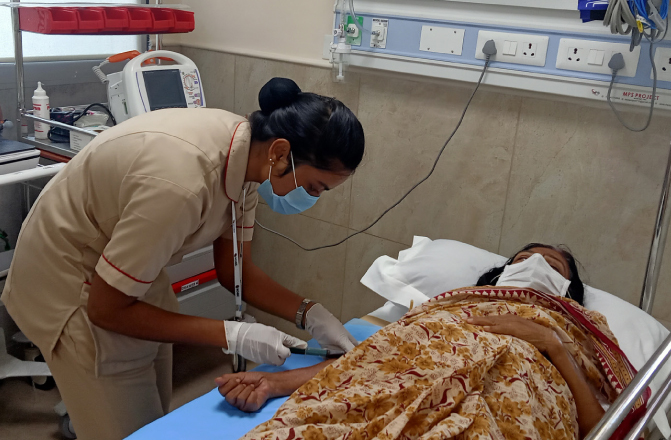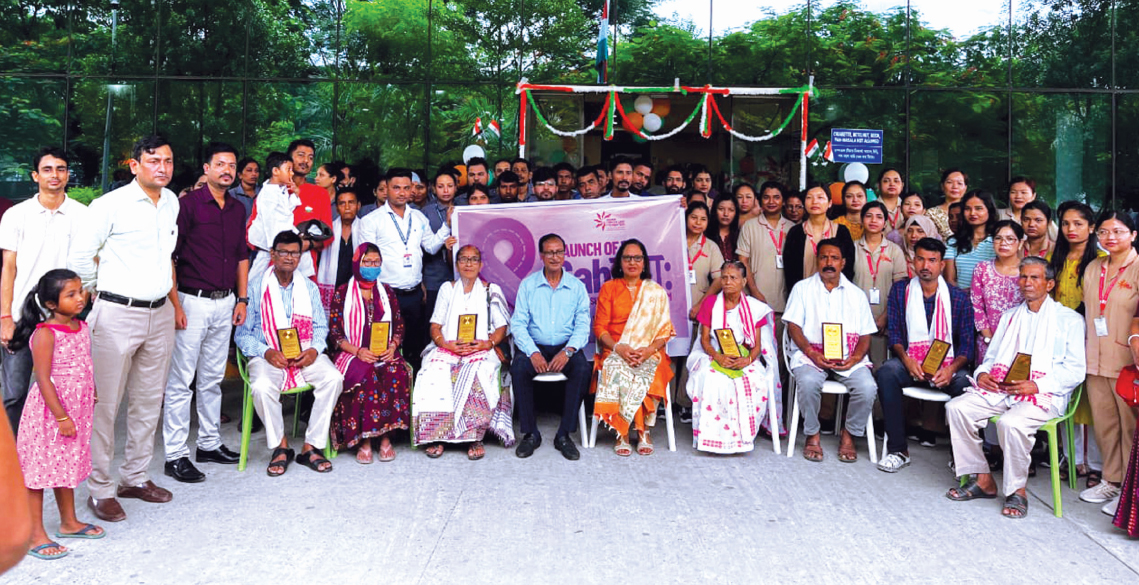A safety net to cut costs and suffering
Cancer patients at Tata Trusts-supported hospitals in Assam and Andhra Pradesh have been provided a lifeline by Federal Bank’s funding for diagnosis, treatment and more
Ramendra Biswas had a niggling problem in his throat, but the 70-year-old from Lakhimpur district in Assam didn’t give it much thought. Then, shortly after, Mr Biswas found it difficult to swallow and investigations revealed he had cancer. More tests followed before he was recommended for surgery at the State Cancer Institute (SCI), the nodal hospital 350km away in Guwahati. It was proving all too much for Mr Biswas.
Expenses for diagnostics and initial treatment had crossed ₹60,000 and there was the surgery cost to come. Financially dependent on his son, a daily-wage labourer, Mr Biswas reckoned he had no option but to forgo further treatment. Then a chance visit to his house by the community outreach team from the local Lakhimpur Cancer Centre changed — and saved — his life.
The team told Mr Biswas about a ‘beneficiary support fund’ provided by Federal Bank for cancer patients in the region. That covered his costs for diagnosis, treatment, and follow-ups, as well as travel and accommodation. “I had given up hope but the financial assistance enabled the completion of my treatment,” says Mr Biswas. “It made me feel I was not left alone to fight against this disease.”
The help that Mr Biswas received from the Federal Bank fund was routed through the Assam Cancer Care Foundation (ACCF), established in 2017 as a collaboration between the Tata Trusts and the Government of Assam. Federal Bank has been a generous contributor to ACCF, supporting a partnership that benefits the neediest cancer patients in Assam.
“No amount of motivation can bring cancer patients to the hospital if they feel they cannot afford the treatment,” says Dr Debashish Shome, ACCF’s operations and planning manager. “We try to ease the financial worries of patients with the beneficiary fund.”
Critical backing
With SCI as its hub, ACCF manages a network of nine hospitals in Assam. Backing from entities like Federal Bank has been a boon for the Foundation. Federal Bank has also been supporting the Tata Cancer Care Foundation (TCCF), established by the Tata Trusts to manage a network of cancer care facilities across India.
Among these is the Sri Venkateswara Institute of Cancer Care and Advanced Research (SVICCAR) in Tirupati. This was set up by TCCF in collaboration with the Government of Andhra Pradesh and the Tirumala Tirupati Devasthanams. The necessity for such facilities is acute.
Says KVS Manian, chairman and managing director of Federal Bank: “The most obvious idea is to provide funding for treatment, but there are some aspects of cancer care that are not covered by government or insurance schemes, aspects that are not claimable.”
This means providing diagnostic support for the early and accurate detection of cancer, as well as its confirmation through molecular pathology tests, biopsies, and advanced imaging. Additionally, there’s support for transportation and accommodation for patients and their caregivers. These expenses have to be borne by patients.
The average cost of comprehensive cancer treatment in private hospitals — including diagnostics, surgery and radiotherapy — ranges between ₹500,000 and 600,000. For those undergoing targeted therapy, six cycles of chemotherapy can cost as much as ₹80,000. These expenses, which are increasing all the time, place enormous financial pressure on patients and their families.
“Pre-diagnostic tests or minor, invasive surgeries for investigation in a city like Guwahati may cost upwards of ₹15,000,” adds Dr Shome. “This sort of expenditure is unaffordable for many patients.” That can lead to delayed diagnoses, high treatment dropout rates and poor health outcomes. It also leads to late-stage detection and significantly reduced chances of survival. An estimated 70% of cancer cases in India are diagnosed at an advanced stage, where treatment is more complex and costly and outcomes are often poor.
At SVICCAR in Tirupati, the Federal Bank fund serves several purposes. “The bank has left it to us to utilise the funds as we see fit,” says Dr Prasanth Penumadu, the hospital’s medical director. “The fact that most government or public insurance schemes do not provide coverage until a cancer diagnosis is ascertained stops patients from coming to us.”
Supportive care is another area where patients are not compensated. This refers to problems related to cancer treatment: post-operative complications, delayed side effects, etc that become evident only later. For example, a patient who has completed cancer treatment may return two months after the last procedure with an incisional hernia arising from surgery.
“We use donor funds from corporates like Federal Bank to offer such cancer treatment-related procedures free of cost,” adds Dr Penumadu. “In 2023-24, SVICCAR aided about 200 supportive-care beneficiaries. Some general hospitals may offer coverage for post-surgery procedures, but they are often reluctant to take on cancer patients or treat post-chemotherapy complications.”
This promise of affordable and quality treatment, alongside SVICCAR’s stellar reputation, attracts patients from near and far. M Nagaraju, a 38-year-old daily labourer from Nellore district in Andhra Pradesh, was diagnosed with an endobronchial mass — a malignant growth located in the airways leading to the lungs — that needed to be removed urgently.

Funding support
The initial investigations were done at a Nellore hospital but Mr Nagaraju could not afford the cost of the operation there. He was referred to SVICCAR, where further investigations and treatment were funded by the Federal Bank grant.
With more beneficiary funds coming in, SVICCAR has extended its funding support to special investigations as well. Most pathological tests are conducted in-house and are, therefore, free for patients. But some require an intervention from a distant centre. These cost the patient an additional ₹5,000-6,000. Thanks to Federal Bank, these are now provided free of cost.
Dr Penumadu believes palliative care systems, especially home-based palliative care, would be a big help. “Funds for manpower and travel logistics, since you need someone to visit the patient’s house regularly, would be very useful,” he says.
As the head of a hospital-cum-academic institute, Dr Penumadu would like to see some part of the Federal Bank aid going towards further cancer research. “This would directly and indirectly benefit patients because you never know what breakthrough is around the corner.”
Topping the wish list at the centres in both Andhra Pradesh and Assam is accommodation for patients and their caregivers. For patients coming from far away, finding a place to stay while under treatment is a big challenge, even if this is already being funded. Radiation therapy, for example, typically runs for four to six weeks and requires patients to come in every day for a few hours.
SVICCAR’s patients have access to a free-of-cost guesthouse — also paid for by a corporate donor — many miles away from the hospital, but shuttling back and forth every day in a hospital bus can take its toll. Such lodgings would be a one-time expenditure for the donor, and could go a long way in helping patients.
Regardless of whether future funding can address these issues, Dr Penumadu says Federal Bank’s aid has had a tremendous impact. “Every penny they have contributed has made a difference to the lives of our patients,” he says.
